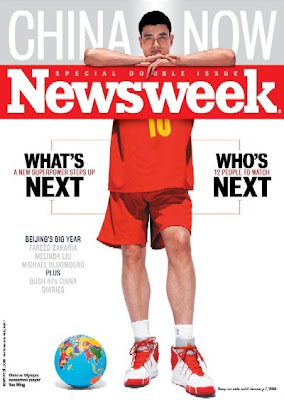NEWSWEEK: Cover: What's Next: China

The December 31, 2007 - January 7, 2008 issue of Newsweek (on newsstands Monday, December 24), "What's Next: China" explains how China's ascension to a global superpower is no longer a forecast but a reality. In the cover package, a team of correspondents and columnists look at China's dramatic changes, its new place in the world and its hopes for the 2008 Beijing Olympics. Plus: the people, ideas, issues and items that will most likely make an impact in 2008. (PRNewsFoto/Newsweek) NEW YORK, NY UNITED STATES 12/23/2007
24 Dec 2007 17:17 Africa/Lagos
NEWSWEEK: Cover: What's Next: China
The Beijing Olympics and Impressive Growth Ensure That 2008 will be the Year of China
China's Rise as a Global Superpower is no Longer a Prediction
NEW YORK, Dec. 23 /PRNewswire/ --
China's ascension to a global superpower is no longer a forecast but a reality. Three decades after its emergence from Mao Zedong's Cultural Revolution, China has grown from one of the world's poorest countries to the second most important country on the planet, according to Newsweek International Editor Fareed Zakaria in the December 31, 2007-January 7, 2008 double issue "What's Next: China" (on newsstands Monday, December 24). China's new position as a superpower, however, is still fragile and it is up to them as well as the United States to handle this shift peacefully.
(Photo: http://www.newscom.com/cgi-bin/prnh/20071223/NYSU001 )
In two decades China has experienced the same degree of industrialization, urbanization and social transformation as Europe did in two centuries. Zakaria writes that so far Beijing has managed to balance economic growth and social stability in a highly fluid environment. Some scholars and policy intellectuals (and a few generals in the Pentagon) look at the rise of China and see the seeds of inevitable great-power conflict and perhaps even war. "Look at history, they say. When a new power rises it inevitably disturbs the balance of power, unsettles the international order and seeks a place in the sun. This makes it bump up against the established great power of the day (that would be us)," he writes. "Conflict and competition -- particularly in the economic realm -- between China and the United States is inevitable. But whether this turns ugly depends largely on policy choices that will be made in Washington and Beijing over the next decade."
But while the conditions exist for peace and cooperation, there are also many factors pointing in the other direction. As China grows in strength, it grows in pride and nationalist feeling -- which will be on full display at the Summer Olympic Games. Beijing's mandarin class is convinced that the United States wishes it ill. Washington, meanwhile -- sitting atop a unipolar order -- is unused to the idea of sharing power or accommodating another great power's interests. Flashpoints like human rights, Taiwan or some unforeseen incident could spiral badly.
The cover package also includes:
-- A personal essay by Beijing Bureau Chief Melinda Liu. Liu, who opened
the first American newsmagazine bureau in Beijing since the communists
came to power, writes about the vast changes she has seen since 1979
and how they have transformed her life and the lives of her family
members. Starting with the Gang of Four trial, she witnessed China's
slow emergence from the wreckage of the Mao years, the horrific
bloodletting at Tiananmen Square, the rise of nationalist sentiment and
handover of Hong Kong, and Beijing's gradual attempts to integrate
itself into the world. Liu also shares the story of how her family
became separated from her brother Guangyuan in 1949 and was reunited 30
years later.
-- Sports Editor Mark Starr writes about China's Olympic ambitions. China
seems poised to knock the United States off its Olympic perch-if not
in Beijing, then in 2012 or 2016, but its interests go beyond medals.
Starr writes that far more is at stake in Beijing than athletic
supremacy. "Beijing is a target for a host of international
grievances -- human rights, environmental practices, food and
manufacturing safety. The Games are its chance to sell the world on a
more benevolent vision of China," he writes.
-- Excerpts from the upcoming book "The China Diary of George H.W. Bush,"
in which the former president chronicled his experience in Mao's China
between October 1974 and December 1975. During his trip, Bush wrestled
with a tough, impenetrable Communist regime; a populace that was
alternately warm and xenophobic; and the repercussions of the American
defeat in Southeast Asia. The experience began to clarify his views on
the workings of the international system-and, most important, America's
place within it.
-- New York City Mayor Michael R. Bloomberg contributes a column in which
he writes, "Just as a growing American economy is good for China, a
growing Chinese economy is good for America. That means we have a stake
in working together to solve common problems, rather than trying to
browbeat or intimidate the other into action. And it means we should
seize on opportunities to learn from one another."
(Read the cover package at www.Newsweek.com)
Fragile Superpower: http://newsweek.com/id/81588
Mao to Now: http://www.newsweek.com/id/81589
President Bush's Diary: http://www.newsweek.com/id/81591
Olympian Ambitions: http://www.newsweek.com/id/81590
A Race We All Can Win: http://www.newsweek.com/id/81592
Photo: NewsCom: http://www.newscom.com/cgi-bin/prnh/20071223/NYSU001
AP Archive: http://photoarchive.ap.org/
AP PhotoExpress Network: PRN1
PRN Photo Desk, photodesk@prnewswire.com
Source: Newsweek
CONTACT: Brenda Velez of Newsweek, +1-212-445-4078
Web site: http://www.newsweek.msnbc.com/
IMPORTANT INFORMATION:
Get paid on 100% of your website traffic, no clicks necessary! How is this possible? CLICK HERE TO SIGN UP NOW

Comments